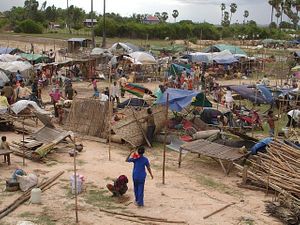Lawyers have filed a criminal complaint against Cambodia’s “ruling elite” at the International Criminal Court (ICC) in The Hague, alleging that crimes against humanity had been committed by authorities responsible for widespread land grabbing.
The filing is being widely seen as a test case that human rights groups hope will set a legal precedent with ramifications for land grabbers across the world and limit the illegal confiscation of land.
“The cumulative effect of these violations has pushed this situation beyond the boundaries of human rights abuses and domestic crimes,” the filing said. It includes allegations of murder, illegal imprisonment and other inhumane acts, among them being forced to live in squalid conditions and being exposed to life threatening illness.
“In furtherance of its twin-objectives of self-enrichment and maintaining power at all costs, the Ruling Elite have committed serious crimes as part of a widespread and systematic attack against the Cambodian civilian population, pursuant to a State policy.
“The crimes fulfill all the legal elements of crimes against humanity.”
The filing says the ruling elite had sought to establish a kleptocratic system “after seizing power” in the 1980s with the twin objectives of “self-enrichment and maintaining power at all costs.”
The primary source of self-enrichment, it says, stems from land grabbing “on a truly massive scale.”
Land grabbing has become a chronic issue across Cambodia over recent years. Angry protests are an almost daily event and the issue contributed to the reduced margins achieved by Prime Minister Hun Sen and his ruling Cambodian People’s Party (CPP) at last year’s election.
Richard Rogers of Global Diligence LLP, who represents ten Filing Victims, says that about 777,000 people, or six percent of the population, had been affected by land grabbing, which he says amounts to a crime of forcible transfers under the ICC statute.
Rogers observes that up until 2012, 145,000 people, or about one percent of the population, had been forcible transferred from Phnom Penh. Among the 190,000 indigenous minorities, half had been excluded from their ancestral lands. About 20,000 Cambodians became new victims of land grabbing conflicts in the first three months of this year.
Rogers expects an initial assessment of the filing will take three to six months. At that point the ICC will decided whether to open a preliminary investigation through the Office of the Prosecutor, which will then send an investigation team to Cambodia.
That preliminary examination could take two to three years, which may lead to a formal investigation and a trial on alleged crimes against humanity committed by Cambodia’s ruling elite.
Rogers said that neither Hun Sen nor the CPP were targeted in the filing because “not everyone in the CPP was land grabbing.” The ICC filing focuses on members of the armed forces, the police, and the gendarmerie responsible for implementing forcible transfers.
“Entire villages have been burned to the ground and possessions stolen or destroyed. The evictions have been perpetrated by armed police, gendarmes, the Royal Cambodian Armed Forces, as well as by private security forces with the support of the State apparatus.”
He said land grabbing in Cambodia was widespread, reflecting a policy put in place by the ruling elite. When taken together these alleged crimes met the ICC threshold in terms of gravity that would qualify the allegations as a crime against humanity.
The filing is endorsed and supported by the International Federation for Human Rights (FIDH) and Global Witness, which monitors environmental exploitation and human rights abuses.
According to the filing, the ruling elite used the state apparatus to “maintain power at all costs” in attacks that were not just limited to Cambodians challenging the system. Also targeted were monks, journalists, lawyers, environmental activists, trade unionists, civilian protestors, and opposition politicians the filing refers to as dissidents.
“Dissidents have been assassinated, murdered, beaten-up, subjected to trumped-up charges and illegal detention, and persecuted due their opposition to the Ruling Elite.
“Initially resorting to tactics such as grenade attacks and drive-by shootings, it is estimated that the Ruling Elite has orchestrated over 300 politically motivated murders since the 1990s.
“In recent years the Ruling Elite have relied heavily on a corrupt judiciary to crush dissent,” it said. “Dissidents have been brutally murdered by professional assassins or condemned to linger in jails on spurious charges.”
Luke Hunt can be followed on Twitter @lukeanthonyhunt
































